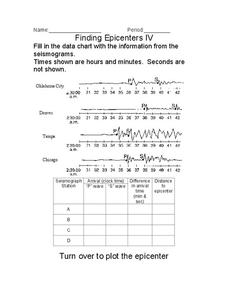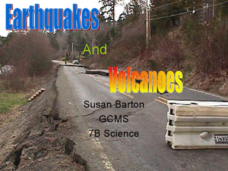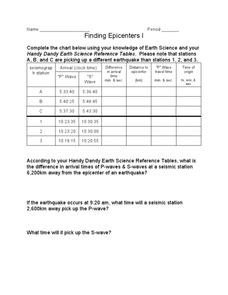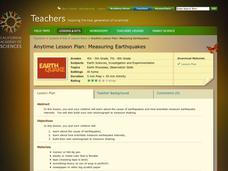DiscoverE
Shake It Up with Seismographs
Shake up your lessons on earthquakes. A simple seismograph lets scholars record "earthquakes" in the classroom. These earthquakes occur when classmates drop balls from different heights. Young scientists measure these with seismographs...
Science Matters
Earthquakes and Volcanoes Post Assessment
The final lesson in the 20-part series is a post assessment covering earthquakes and volcanoes. Twenty-three questions incorporate each of the previous lessons through multiple choice, justified multiple choice, expanded multiple choice,...
Science Matters
Richter Scale
The 12th lesson in a series of 20 opens with a demonstration of exponential functions using pasta. This concept is connected to the Richter Scale, which is also an exponential function. Scholars compare the exponential scale that...
Teach Engineering
Earthquakes Living Lab: Locating Earthquakes
There are patterns in nearly everything — even earthquakes. Pairs research current earthquakes to see if there are any patterns. They determine the mean, median, and mode of the earthquake data, along with the maximum and minimum. Using...
Mr. E. Science
Plate Tectonics
Get a detailed look at plate tectonics with a 14-slide presentation that highlights the Earth's layers, continental drift, seafloor spreading, the theory of plate tectonics, and boundary types. Each slide provides thorough explanations,...
Curated OER
Earthquakes: Third Grade Lesson Plans and Activities
Introduce third graders to energy waves with a hands-on geology activity, in which they answer questions and compare seismograms in the San Francisco Bay area. After a demonstration that shows how bigger waves indicate a high-intensity...
Curated OER
Earthquakes: Fifth Grade Lesson Plans and Activities
After learning about P waves and S waves, fifth graders view the intensity of earthquakes by examining seismographs and images of earthquake damage. Young scientists then forecasting future quakes by analyzing data about earthquakes...
Curated OER
Earthquakes: Sixth Grade Lesson Plans and Activities
Young seismologists learn more about plate tectonics with a set of pre-lab, lab, and post-lab lessons plans on earthquakes. After exploring how waves travel through various materials, sixth graders record their observations and draw...
Institute of Electrical and Electronics Engineers
Shake it up with Seismographs!
Shake things up in your STEM or earth science classroom when you have small groups construct their own seismographs. A reading assignment on the history of seismographs, the Richter scale, and current technology sets the stage for the...
Curated OER
Earthquake Detector
Learners investigate earthquakes and describe the interactions inside the Earth that cause them to occur. Then they research the equipment and systems for detection and measurement of earthquakes. Students also build and engage in a...
Curated OER
Finding Epicenters
In this earthquake worksheet, students use the seismographs from different locations to determine the epicenter for the earthquake. Students plot the epicenter on a map. This worksheet has 1 graphic organizer.
Curated OER
Earthquakes and Volcanoes
Nice pictures, maps and informative diagrams are incorporated into this PowerPoint about earthquake types and the types of waves carrying energy produced. There are a number of pages explaining scientific terminology and diagrams to...
Environment Agency - Abu Dhabi
Earthquakes
What causes earthquakes? What are the effects and impacts of earthquakes? How are earthquakes measured? If there was an earthquake on Mars, would it still be considered an earthquake? Class members will find the answers to these and many...
Curated OER
What are Earthquakes?
Here is a scientific presentation of earthquakes. The elastic rebound theory is explained, as well as the different types of waves and how they are measured. Just a note: Slide number 15 has a diagram that is upside down. Enable editing...
Curated OER
Earthquakes and Seismic Waves
Students explore earthquakes and seismic waves. They investigate how energy is released in the subsurface to create seismic waves. Students explore the inner workings of a seismograph and how they are used to determine the location of an...
Curated OER
Epicenters
In this earthquake worksheet, students use seismographs to determine how far away the cities were from the epicenter of an earthquake. This worksheet has 1 graphic organizer.
Curated OER
Finding Epicenters 1
In this finding epicenters worksheet, students complete a table given the "P" and "S" wave arrival times of 6 different earthquakes. Students calculate the difference in arrival time of the waves, the distance to the epicenter, the "P"...
Curated OER
Earthquake Power
In this earthquakes instructional activity, students learn about the measurements of earthquakes on the Richter scale. They answer six questions about the magnitudes and sizes of earthquakes using two tables of data about earthquakes and...
Curated OER
Build a Seismograph
In this seismograph worksheet, students build a device to record the motion of a simulated earthquake. They give details of their structure and explain how it works. They present their device to the class and answer questions about their...
Curated OER
Earthquakes Study Guide
In this earthquakes worksheet, learners answer questions about the components of earthquakes, the causes of earthquakes, how they are measured, the types of seismic waves and the types of faults. They also answer questions about the...
Curated OER
Determining the Time of an Earthquake
In this earthquake worksheet, students will study a table showing the travel times of seismic waves from an earthquake. Students will use this information to determine when and where the earthquake occurred. This worksheet has 6 short...
Curated OER
Earthquakes Rock!
Learners study the main methods to measure earthquakes; the Richter Scale and Mercalli Scale. They make a model of a seismograph and investigate which structural designs are most likely to survive an earthquake.
California Academy of Science
Measuring Earthquakes
After a brief discussion on earthquakes, make a makeshift seismograph to record the shaking of the table that it sits upon. While the background information will be useful to you as a teacher, the seismograph does not seem like it would...
Curated OER
Determining Epicenter Distance
In this earthquake learning exercise, learners determine the distance of the epicenter based on the S-waves and P-waves on a seismograph. This learning exercise has 4 problems to solve.

























